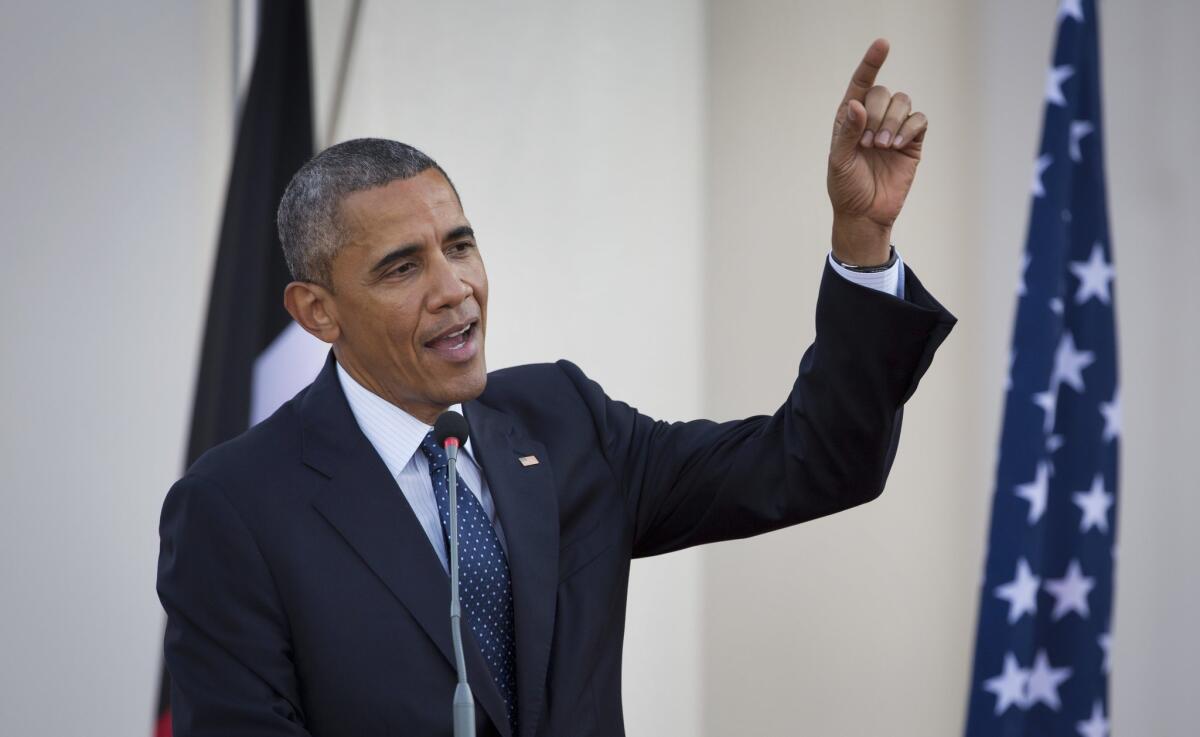Kenyans bemoan corruption as Obama calls for prosperity through start-ups

President Obama answers questions from the media after meeting with Kenya’s President Uhuru Kenyatta at the State House in Nairobi, Kenya, on Saturday.
When President Obama called young Kenyans with great ideas “the spark of prosperity,” Kenyan small-businessman Delbert Mageto was inspired — and frustrated.
As the Kenyan government pushes the hashtag #MagicalKenya during Obama’s Kenya tour, Mageto feels that his good ideas are being choked by hefty government fees and taxes, and his opportunities thwarted by corruption.
“You can get a start-up moving at the speed of how fast you can text,” Obama said launching the Global Entrepreneurship Summit in Nairobi on Saturday. He said young African entrepreneurs are the continent’s future, but cautioned that governments cannot allow small would-be businesspeople to be stymied by corruption and big investors to be discouraged by the costs that corruption adds to business dealings.
“Africa is on the move,” said Obama, citing the growth of the middle class. “Young people ready to start something on their own: that’s entrepreneurship. It’s the spark of prosperity. It helps citizens stand up for their rights and push back against corruption.
“You don’t have to look a certain way or have a certain last name to have an idea.”
NEWSLETTER: Get the day’s top headlines from Times Editor Davan Maharaj >>
Along with thousands of other Kenyans, Mageto, 39, waited in central Nairobi to try to catch a glimpse of President Obama’s limousine, but he was disappointed when it took another route.
His small business, a tiny courier and errand service in Nairobi, has five clients and he can’t afford the $500 fee for a license, which means no website, no advertising and registration, or “they’ll catch me.”
In Kenya, he said, there are situations when your last name and who you know count more than it should.
“There’s also corruption. The corruption problem is so bad. When you are looking for business, it’s who you know,” he said. “Or maybe you will use money. The person in authority who can give you some business, you have to give them money so that they can give you business.
“Even the president is fighting corruption,” he added, referring to Kenyan President Uhuru Kenyatta. “But in my view, he’s not been able to do it because even the senior people in the government, those friends of the president, are involved in corruption.”
In a joint news conference with Kenyatta, Obama said high-profile prosecutions of those involved in such illegalities would be necessary to change an entrenched culture of corruption.
Kebaso Onchana, 34, dressed in a gray pinstriped suit, gray pinstriped tie and gray pinstriped shirt, jostled with other Kenyans in the hope of a glimpse of Obama. Onchana, who supports himself selling diet foods, dreams of creating a business to build drones and electric cars in Kenya. He wrote to President Kenyatta a year ago, pitching his idea and begging for the government to back the project, but he got no reply.
“The problem is capital, capital. I want to build an empire, but I don’t have capital. I just have a little capital that my parents gave me. It’s difficult to get capital because you need collateral, which we don’t have.”
Onchana said it was difficult for ordinary Kenyans to get good jobs that pay a decent wage.
“One problem is corruption. It affects you because you have to bribe, in order to get a job,” he said. “President Obama understands about corruption in Kenya, but he doesn’t understand the depth of corruption and the magnitude of corruption. He understands it’s very hard, but he doesn’t understand how difficult it is. He knows it’s hard in Africa to excel. He knows it. But it’s very hard.
“Look at me. We are university students. We have the knowledge. We are tech-savvy. But it’s difficult to get capital.”
More to Read
Sign up for Essential California
The most important California stories and recommendations in your inbox every morning.
You may occasionally receive promotional content from the Los Angeles Times.










